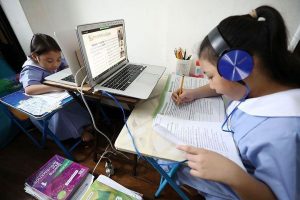Stock Market Ends the Week Strong: Could It Spark a Bullish January?
AI to customize learning — experts

ARTIFICIAL INTELLIGENCE (AI) is expected to further personalize Filipino students’ learning, which could help address the country’s worsening learning crisis, according to industry experts.
Ryan Lufkin, vice-president of global academic strategy at Instructure, said that the ability of AI to provide a more “personalized” learning experience in the next few years would help address bottlenecks in the education sector.
“That personalized learning experience, we’re going to do more and more, I think, in the next year or two with how we deliver just an experience that is specific to you,” he said in a video interview.
The Philippines has been hard-pressed to keep up with other countries’ adoption of AI amid its potential to bridge the learning and workforce skills gap.
“AI addresses educational gaps by providing personalized learning experiences and identifying areas where students need additional support,” Danda Crimelda Buhain-Garcia, chief external affairs officer at REX Learning, said in an e-mail.
“By leveraging AI, we can enhance the quality of education and address the issues highlighted by the PISA (Programme for International Student Assessment) results.” The Philippines ranked 77th out of 81 countries in the Organisation for Economic Co-operation and Development’s (OECD) 2022 PISA for 15-year-old learners. This meant Filipino students showed low proficiency in reading, mathematics, and science.
REX Learning said it recently partnered with PowerSchool, a US-based cloud K-12 (Kindergarten to Grade 12) software, to adopt its Schoology Learning System.
Integrating advanced technologies, such as PowerSchool’s software, has helped revolutionize REX Learning’s approach to providing knowledge tools, according to Ms. Buhain.
“Through PowerSchool’s Schoology Learning system, we have been able to personalize learning pathways, ensuring that each student receives an education tailored to their unique needs and capabilities.”
PowerSchool provides a unified platform for managing educational activities as it streamlines workflows for both students and teachers. It has resulted in increased student engagement, better academic performance, and higher satisfaction scores among teachers and students.
Included in the partnership is REX Learning’s adoption of PowerSchool’s AI assistant, PowerBuddy. The tool is expected to enable teachers to quickly assess a student’s learning style, strengths, and areas for improvement.
To date, Schoology is being used in over 100 REX-affiliated schools, serving 83,126 students.
“Our goal is to expand the platform’s (PowerSchool) reach across various regions in the Philippines, prioritizing areas that are in dire need of technological advancement in education.”
For its part, Instructure has been working on improving how it provides content for student users through its learning platform, Canvas LMS (Learning Management System).
“The idea that if it could actually, specific to you, understand where you’re struggling and provide additional resources and additional micro-learning tools,” Mr. Lufkin said.
“These are all things that we’ve talked about with our customers as things that we want to explore and potentially deliver in the future.”
However, educational institutions need to get rid of their skepticism of AI to fully utilize its benefits, analysts said.
According to Mr. Lufkin, educational institutions are responsible for teaching their students the proper use of AI, knowing that this will be used even as they enter the workforce.
“We still have to face that challenge that not all educators, not all institutions really are recognizing AI as a positive tool,” he said in a video interview.
Mr. Lufkin noted that many educators remain skeptical of AI and “really still continue to focus on the fact that it’s a cheating tool.”
“Realistically, students are going to be using these tools throughout their educational cycle, but well into their careers as well. So, we need to make sure that we’re preparing students to use them in their careers,” he added.
To maintain academic integrity, schools must emphasize the role of AI as a “supportive tool” instead of a replacement for human judgment and creativity, Ms. Buhain said. — Beatriz Marie D. Cruz










